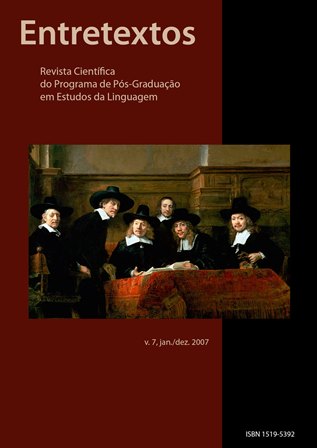Knowledge of another through foreign language: reset identities
DOI:
https://doi.org/10.5433/1519-5392.2007v7n1p138Keywords:
Alterity, Foreing language, Literary text, Culture, IdentityAbstract
Through the alterity, which is seen as an identity condition, the student of a foreing language can understand other culture when he defines his own identity. From the lecture of the short story Rodríguez, by Francisco Espínola, students of Spanish got in touch with a character who makes part of their culture, the gaúcho, but in Argentina and Uruguai it has other meanings. With the analysis of the reading instruments we could realize that most of the students couldn't differentiate the gaúcho from Rio Grande do Sul from the gaucho, due to the difficulty of understanding the text and/or because they transferred crystallized characteristics from the first to the second, even the text not giving elements to this. Therefore, it's evident the importance of the teacher as a mediator in this rich task in the teaching/learning process of other language, which is the knowledge of the other.Downloads
References
BACHMAN, Lyle. A habilidade comunicativa da linguagem. Trad. Niura Maria Fontana. Linguagem e Ensino, v. 6, n. 1, p. 77-128, jan./jun. 2003.
BAKHTIN, M. M. Estética da criação verbal. São Paulo: Martins Fontes, 2003.
BAKHTIN, M. M. Freudism. A marxist critique. New York: Academic Press, 1976.
BAKHTIN, M. M. Marxismo e Filosofia da Linguagem. São Paulo: Hucitec, 1997
BAKHTIN, M. M. Problemas da poética de Dostoiévski. Rio de Janeiro: ForenseUniversitária, 1981.
BENVENISTE, Émile. Problèmes de linguistique générale II. Paris: Gallimard, 1974.
BHABA, Homi. O local da cultura. Belo Horizonte: UFMG, 1998.
BOURDIEU, Pierre. A economia das trocas lingüísticas: o que falar quer dizer. São Paulo: USP, 1998.
CANCLINI, Néstor García. A globalização imaginada. São Paulo: Iluminuras, 2003.
CASTRO, G. Em busca de uma lingüística sociológica: contribuições para uma leitura de Bakhtin. Curitiba, 1993. Dissertação (Mestrado) - Universidade Federal do Paraná, Curitiva, 1993.
DURANTI, Alessandro. Antropologia del linguaggio. Roma: Metelmi, 2002.
ESPÍNOLA, Francisco. Cuentos completos. Montevideo: Arca, 1993.
HYMES, Dell. On communicative competence. In: PRIDE, J. B.; HOLMS, J. (ed.) Sociolinguistics. Hamondsworth: Penguin, 1972.
ORLANDI, Eni Puccinelli. Interpretação: autoria, leitura e efeitos do trabalho simbólico. Petrópolis: Vozes, 1996.
RAJAGOPALAN, Kanavillil. Por uma lingüística crítica: linguagem, identidade e a questão ética. São Paulo: Parábola editorial, 2003 (Linguagem 4).
WOOWARD, K. Identidade e diferença: uma introdução teórica e conceitual. In: SILVA, T. T. (org.). Identidade e diferença: a perspectiva dos estudos culturais. Petrópolis: Vozes, 2004.
Downloads
Published
How to Cite
Issue
Section
License
Copyright (c) 2007 Entretextos

This work is licensed under a Creative Commons Attribution 4.0 International License.
Entretextos adota a Licença Creative Commons Attribution 4.0 International, portanto, os direitos autorais relativos aos artigos publicados são do/s autor/es.
Sob essa licença é possível: Compartilhar - copiar e redistribuir o material em qualquer suporte ou formato. Adaptar - remixar, transformar, e criar a partir do material, atribuindo o devido crédito e prover um link para a licença e indicar se mudanças foram feitas.























